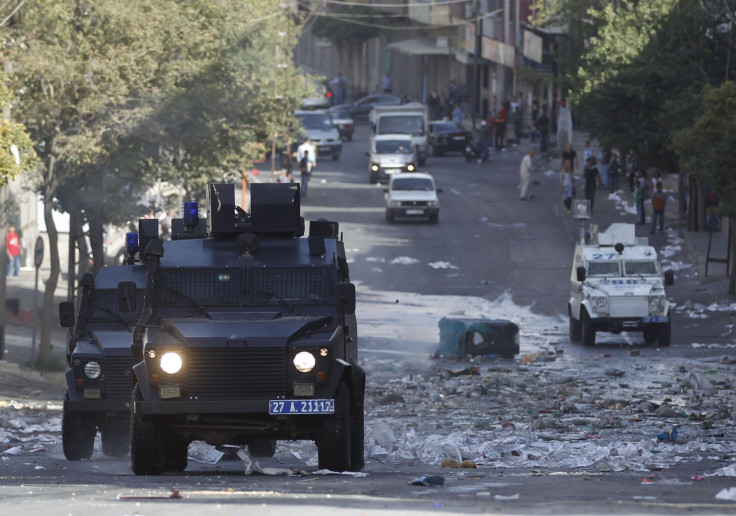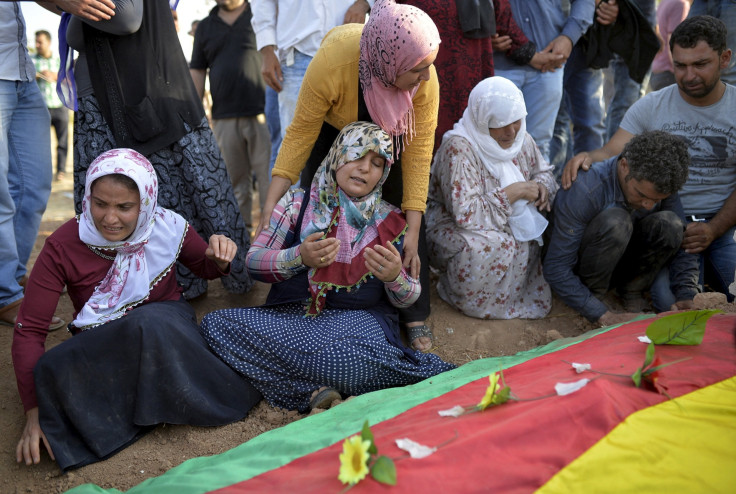Kurds Joining Islamic State? ISIS Finds Unlikely Supporters Among Turkey's Disgruntled Kurds

The city of Adiyaman in southeast Turkey is known mostly for its nearby Greek ruins. But when a 20-year-old man who grew up there detonated himself earlier this month in the southern Turkish town of Suruc, killing 31 people, its growing reputation as a haven for Kurds eager to join the Islamic State group made international headlines.
Turkey's Kurdish enclaves might not seem ripe for radical recruitment given that many Kurds in the region have crossed into Syria in recent months to battle the Islamic State group, also known as ISIS or ISIL. Yet, as United States policy makers increasingly rely on Kurdish fighters on the ground in Syria and Iraq in the war against ISIS, a growing number of youth are trading the Kurdish nationalism of their fathers for the vision espoused by radical Jihadist groups in Syria. Poverty and underdevelopment, internal Kurdish divisions and a widespread feeling of political disenfranchisement are all fueling the militant campaign in Turkey's southeastern conservative region.
"This is the first time we've seen a group in the Middle East effectively establish territory and announce it as a caliphate, so it's quite an attraction for a lot of young radical Muslims," said Gareth Jenkins, an Istanbul-based expert for the Silk Road Studies Program, a Central Asia research center.
In recent years, hundreds of Kurds from Turkey, Iraq and Syria have joined the Islamic States' ranks, according to experts and government officials. In one highly publicized incident, a high-ranking Kurdish leader of ISIS from the city of Erbil in Iraq, Ziad Salim Mohammad Ali al-Kurdi, was killed earlier this year in a U.S.-led coalition airstrike.
Across Turkey's Kurdish communities, it's not uncommon to see extremists working under the guise of nongovernmental organizations, allowing them to quietly slip in and out of ISIS-controlled territories. They stay away from government-sanctioned mosques, instead preferring their own politically-charged prayer spaces. In tea houses, like the one previously owned by Seyh Abdurrahman Alagoz, the young man responsible for the Suruc bombing, supporters of ISIS propagate their message and share glowing tales of life under the militants' rule, where alcohol was forbidden and crime virtually nonexistent.
"The worrying thing has always been the freedom of which groups such as ISIS and their supporters have been able to propagandize and recruit," Jenkins said. "These places were allowed to operate very, very openly."

Alagoz, whose July 20 bombing targeted left-wing youth volunteering to help rebuild the Kurdish city of Kobani, spent six months in training camps in Syria, and was placed on a wanted-list late last year after his father filed a complaint with the police about both him and his brother joining ISIS. A total of 17 other families in Adiyaman have also reported their children missing to ISIS in recent months, and police have said they consider them at high risk of carrying out further terrorist attacks.
Alagoz was the second suicide bomber to come from Adiyaman in the last two months. Another young Kurdish man, Orhan Gondar, was suspected of carrying out a suicide bomb attack at a left-wing Kurdish political rally in the further east city of Diyarbakir in June.
Kurd Vs. Kurd
The poorest areas in Turkey's southeast have been the most fertile recruiting grounds for ISIS, experts said. Unemployment in Turkey's Kurdish region is about six times higher than elsewhere across the country, the Christian Science Monitor has reported. The region is also considerably less developed than elsewhere in Turkey, with poor housing and governmental infrastructure.
But the lure of ISIS goes beyond class divisions. As the war in Syria has re-energized Kurdish political movements operating in southeast Turkey, a wide division has also resurfaced among left-wing and conservative Kurds. The Kurdistan Workers' Party (PKK), a guerilla movement which was founded to carve out a secular autonomous state, has been the loudest voice in Kurdish politics for decades and their policies have prompted some Kurdish youth to look toward religious extremist groups for alternatives.
"Kurdish society is a religious society, and many have a problem with the PKK's secular language, so many are changing their [views] about them," Mehmet Kurt, an assistant professor of sociology at Bingol University and Newton Advanced Fellow in School of Law at Queen Mary University of London, who has written a book on Kurdish Islamist groups, said.
Left-wing Kurds have blamed last week's bombing on the Turkish government for failing to crackdown on ISIS in the country. They launched a series of retaliatory attacks against government targets and supporters of ISIS in Turkey. Many of those attacks, as well as attacks carried out in solidarity late last year with the Kurdish city of Kobani in Syria, were targeted against outwardly conservative individuals who were thought to be affiliated with Kurdish Islamist parties.
The surge in tensions has helped bring Kurdish Islamist groups that have been quiet in recent years back to the political scene. Two decades ago, the left-wing PKK and the most prominent Islamist Kurdish group, Hezbollah, vied violently for influence in the country's southeast. Hezbollah, not to be confused with the Shiite militia in Lebanon which shares its name, sought to counter the PKK's secular and liberal mission, and was instead part of a movement to promote Islamist politics in Turkey.
"Many people have this misunderstanding that they do [support ISIS], but their members are more tolerant toward ISIS because of their opposition to the PKK," Kurt said.

In cities like Adiyaman, on the frays of Turkey's Kurdish territory, the absence of local Islamist groups has actually created a vacuum of alternatives to ISIS, allowing radicals from Syria to exploit the rising internal Kurdish political divisions and win over impressionable recruits, Jenkins, the Istanbul-based Turkey analyst, said.
After Suruc, Turkey Cracks Down
Over the last few months, Turkey has been gradually stepping up its restrictions on ISIS, detaining hundreds of alleged supporters. After last week's bombing, at least 1,000 individuals were detained across the country. A vast majority of those individuals detained, however, were affiliated with outlawed left-wing Kurdish organizations, and it was unclear how many were actually charged with crimes after being detained.
It appeared the government was cracking down not just on ISIS supporters, but also on their recruitment tools, as a number of prominent pro-ISIS websites were blocked by the government, Reuters reported. But as radicals from Syria continued to exploit a long-standing and growing internal division among Kurds and promote their alternative vision of a global Muslim caliphate, the recent crackdown seemed unlikely to address deeper issues responsible for extremism.
"Kurdish society is a traumatized society," Kurt said. "They have no real sense of belonging or identity... these historical issues create more viable environment for radical Islamists like ISIS."
© Copyright IBTimes 2025. All rights reserved.





















